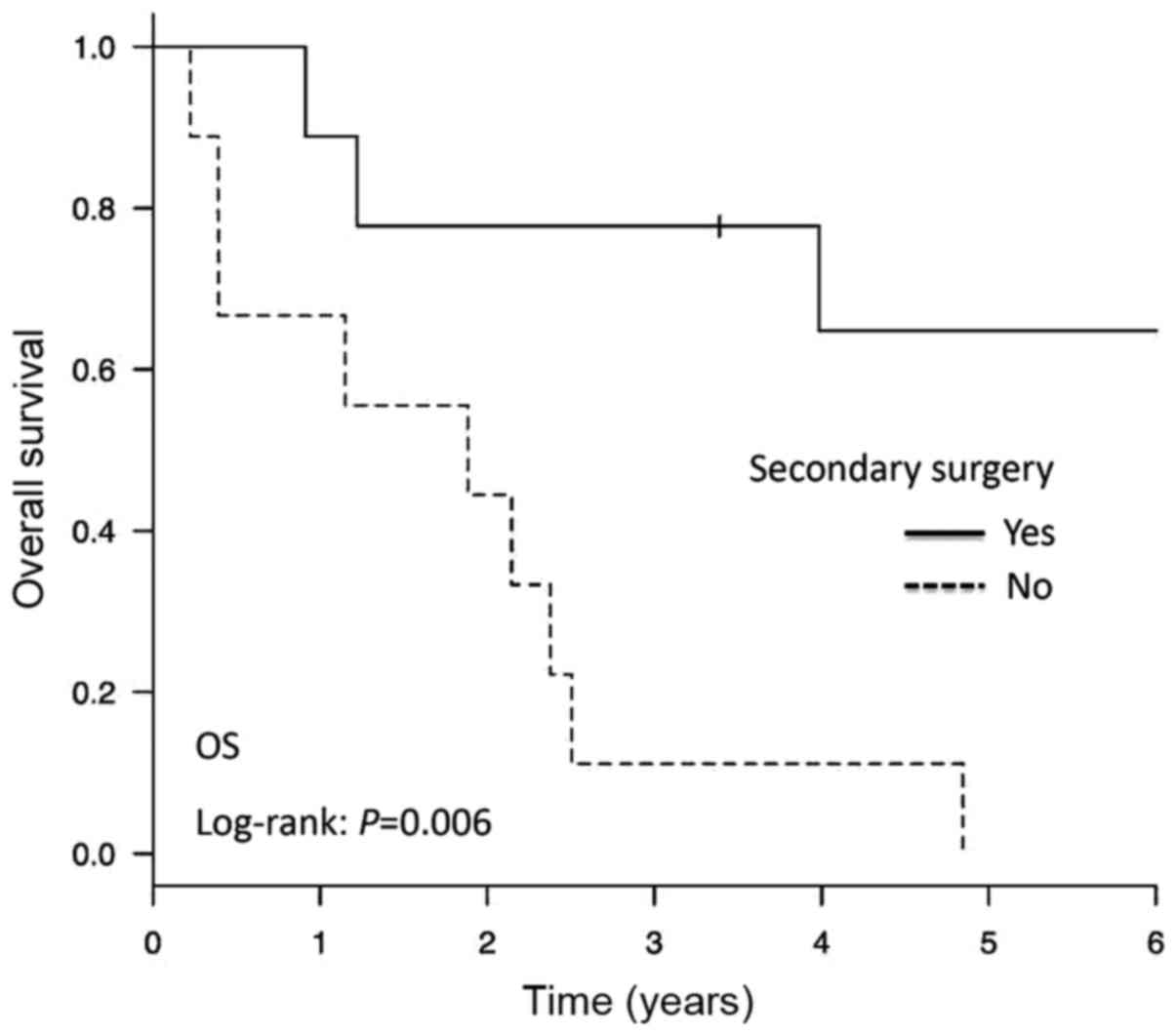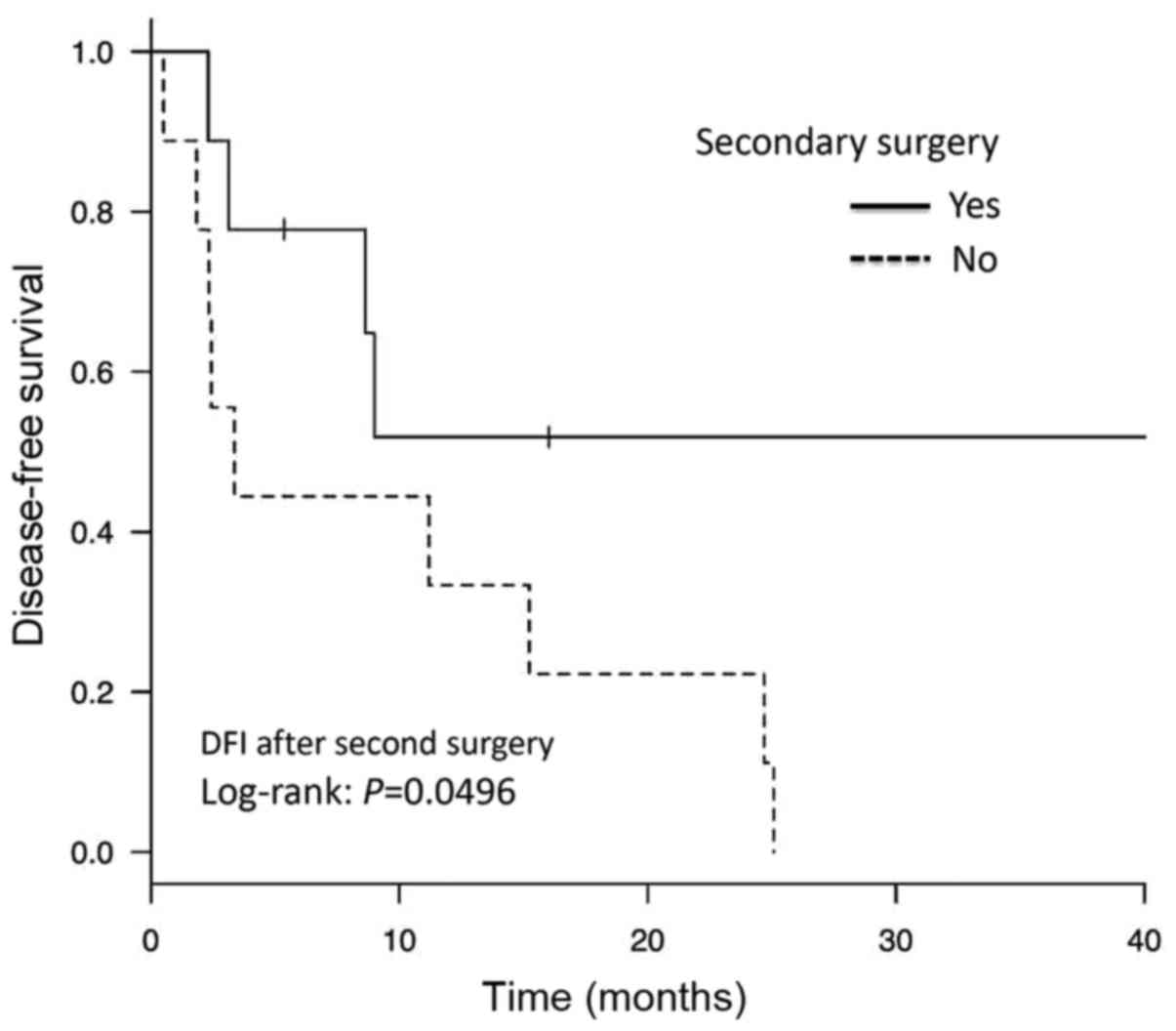|
1
|
Park JY, Kim DY, Suh DS, Kim JH, Kim YM,
Kim YT and Nam JH: Prognostic factors and treatment outcomes of
patients with uterine sarcoma: Analysis of 127 patients at a single
institution, 1989–2007. J Cancer Res Clin Oncol. 134:1277–1287.
2008. View Article : Google Scholar : PubMed/NCBI
|
|
2
|
Burghaus S, Halmen S, Gass P, Mehlhorn G,
Schrauder MG, Lux MP, Renner SP, Beckmann MW, Hein A and Thiel FC:
Outcome and prognosis in uterine sarcoma and malignant mixed
Mullerian tumor. Arch Gynecol Obstet. 294:343–351. 2016. View Article : Google Scholar : PubMed/NCBI
|
|
3
|
Fujita H, Adachi S, Kigawa J, Sugiyama T
and Takeuchi S: A clinicopathlogical study of uterine sarcoma in
last decade-a retrospective study of KCOG/USSG inter group study.
Adv Obstet Gynecol. 56:463–465. 2004.
|
|
4
|
Giuntoli RL II, Garrett-Mayer E, Bristow
RE and Gostout BS: Secondary cytoreduction in the management of
recurrent uterine leiomyosarcoma. Gynecol Oncol. 106:82–88. 2007.
View Article : Google Scholar : PubMed/NCBI
|
|
5
|
Mayerhofer K, Obermair A, Windbichler G,
Petru E, Kaider A, Hefler L, Czerwenka K, Leodolter S and Kainz C:
Leiomyosarcoma of the uterus: A clinicopathologic multicenter study
of 71 cases. Gynecol Oncol. 74:196–201. 1999. View Article : Google Scholar : PubMed/NCBI
|
|
6
|
Leath CA III, Huh WK, Hyde J Jr, Cohn DE,
Resnick KE, Taylor NP, Powell MA, Mutch DG, Bradley WH and Geller
MA: A multi-institutional review of outcomes of endometrial stromal
sarcoma. Gynecol Oncol. 105:630–634. 2007. View Article : Google Scholar : PubMed/NCBI
|
|
7
|
Callister M, Ramondetta LM, Jhingran A,
Burke TW and Eifel PJ: Malignant mixed mullerian tumors of the
uterus: Analysis of patterns of failure, prognostic factors and
treatment outcome. Int J Radiat Oncol Biol Phys. 58:786–796. 2004.
View Article : Google Scholar : PubMed/NCBI
|
|
8
|
Anraku M, Yokoi K, Nakagawa K, Fujisawa T,
Nakajima J, Akiyama H, Nishimura Y and Kobayashi K; Metastatic Lung
Tumor Study Group of Japan, : Pulmonary metastases from uterine
malignancies: Results of surgical resection in 133 patients. J
Thorac Cardiovasc Surg. 127:1107–1112. 2004. View Article : Google Scholar : PubMed/NCBI
|
|
9
|
Anderson TM, McMahon JJ, Nwogu CE, Pombo
MW, Urschel JD, Driscoll DL and Lele SB: Pulmonary resection in
metastatic uterine and cervical malignancies. Gynecol Oncol.
83:472–476. 2001. View Article : Google Scholar : PubMed/NCBI
|
|
10
|
Levenback C, Rubin SC, McCormack PM,
Hoskins WJ, Atkinson EN and Lewis JL Jr: Resection of pulmonary
metastases from uterine sarcomas. Gynecol Oncol. 45:202–205. 1992.
View Article : Google Scholar : PubMed/NCBI
|
|
11
|
Hoang HL, Ensor K, Rosen G, Leon Pachter H
and Raccuia JS: Prognostic factors and survival in patients treated
surgically for recurrent metastatic uterine leiomyosarcoma. Int J
Surg Oncol. 2014:9193232014.PubMed/NCBI
|
|
12
|
Reed NS: The management of uterine
sarcomas. Clin Oncol (R Coll Radiol). 20:470–478. 2008. View Article : Google Scholar : PubMed/NCBI
|
|
13
|
Burt BM, Ocejo S, Mery CM, Dasilva M,
Bueno R, Sugarbaker DJ and Jaklitsch MT: Repeated and aggressive
pulmonary resections for leiomyosarcoma metastases extends
survival. Ann Thorac Surg. 92:1202–1747. 2011. View Article : Google Scholar : PubMed/NCBI
|
|
14
|
Leitao MM, Brennan MF, Hensley M, Sonoda
Y, Hummer A, Bhaskaran D, Venkatraman E, Alektiar K and Barakat RR:
Surgical resection of pulmonary and extrapulmonary recurrences of
uterine leiomyosarcoma. Gynecol Oncol. 87:287–294. 2002. View Article : Google Scholar : PubMed/NCBI
|
|
15
|
Chen H, Pruitt A, Nicol TL, Gorgulu S and
Choti MA: Complete hepatic resection of metastases from
leiomyosarcoma prolongs survival. J Gastrointest Surg. 2:151–155.
1998. View Article : Google Scholar : PubMed/NCBI
|
|
16
|
Korets SB and Curtin JP: Surgical options
for recurrent uterine sarcomas. Am Soc Clin Oncol Educ Book. 1–366.
2012.
|
|
17
|
Yoshinaga M, Togami S, Tsuji T, Fukamachi
N, Kamio M, Yanagi M and Douchi T: Clinical outcome of metastatic
uterine leiomyosarcoma and carcinosarcoma in a single institute. J
Obstet Gynaecol Res. 33:818–822. 2007. View Article : Google Scholar : PubMed/NCBI
|
|
18
|
Benson C, Ray-Coquard I, Sleijfer S,
Litière S, Blay JY, Le Cesne A, Papai Z, Judson I, Schöffski P,
Chawla S, et al: Outcome of uterine sarcoma patients treated with
pazopanib: A retrospective analysis based on two European
organisation for research and treatment of cancer (EORTC) soft
tissue and bone sarcoma group (STBSG) clinical trials 62043 and
62072. Gynecol Oncol. 142:89–94. 2016. View Article : Google Scholar : PubMed/NCBI
|
|
19
|
Han Y, Li S, Holt HK and Wu L: Curative
effect of bevacizumab combined with chemotherapy in advanced or
recurrent uterine sarcoma. Mol Clin Oncol. 4:245–248. 2016.
View Article : Google Scholar : PubMed/NCBI
|
|
20
|
Martin-Broto J, Pousa AL, de Las Peñas R,
García Del Muro X, Gutierrez A, Martinez-Trufero J, Cruz J, Alvarez
R, Cubedo R, Redondo A, et al: Randomized Phase II study of
trabectedin and doxorubicin compared with doxorubicin alone as
first-line treatment in patients with advanced soft tissue
sarcomas: A spanish group for research on sarcoma study. J Clin
Oncol. 34:2294–2302. 2016. View Article : Google Scholar : PubMed/NCBI
|
|
21
|
Schöffski P, Chawla S, Maki RG, Italiano
A, Gelderblom H, Choy E, Grignani G, Camargo V, Bauer S, Rha SY, et
al: Eribulin versus dacarbazine in previously treated patients with
advanced liposarcoma or leiomyosarcoma: A randomised, open-label,
multicentre, phase 3 trial. Lancet. 387:1629–1637. 2016. View Article : Google Scholar : PubMed/NCBI
|
















